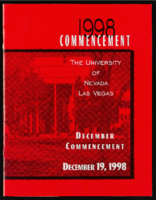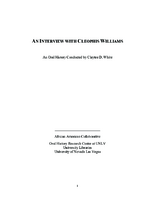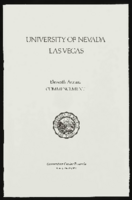Search the Special Collections and Archives Portal
Search Results

Transcript of interview with Florence McClure by Joanne Goodwin, January 24, 1996 & February 6, 1996
Date
Archival Collection
Description
Florence McClure came to Las Vegas later in her life, but the state felt her presence and the community her contributions as if she were a native daughter. Introduced to the League of Women Voters in 1967, McClure met her political mentor Jean Ford and learned how to practice the core elements of democracy. She put those tools to work in a number of ways, however her participation in the creation of the Rape Crises Center and her advocacy for locating the women’s prison near Las Vegas are two of her long-lasting efforts. Florence Alberta Schilling was born in southern Illinois where she enjoyed the security of a tight-knit family and the independence to test her abilities growing up. She graduated from high school and attended the MacMurray College for Women at Jacksonville. With the attack on Pearl Harbor in 1941, she began a series of jobs working for the war effort. She moved to Ypsilanti, Michigan with a girlfriend to work at the Willow Run Army Airbase and then moved to Miami, Florida where she worked for the Provost Marshall in the Security and Intelligence Division. She met her husband, James McClure, at the time and they married in 1945. During the next several years, they raised a family and moved around the country and to Japan with the military. McClure came to Las Vegas in 1966 as part of her work in the hotel industry which she engaged in after her husband’s retirement from the military. She had worked in California and Miami Beach, but it was Burton Cohen in Los Angeles who invited her to join him in a move to Las Vegas to build the new Frontier Hotel and Casino. Following the completion of the Frontier, she moved to the Desert Inn with Cohen in 1967 and worked as the executive office manager. After a few years, she decided to leave the industry and complete her college education. She graduated from UNLV in 1971with a BA in Sociology with an emphasis on criminology. She was 50 years old. McClure had been a member of the League of Women Voters for a few years at that point and had learned the political process from Jean Ford and workshops on lobbying. She had numerous skills that were waiting to be tapped when she attended an informational meeting on the incidence of rape in the Las Vegas valley. From that meeting, a small group of individuals, including McClure, began the organization Community Action Against Rape (later renamed the Rape Crisis Center) in 1973. It was the first agency in the area devoted to serving individuals who had been assaulted and changing the laws on rape. The organization’s first office was set up in McClure’s home. Over the next decade, she worked to change attitudes and reshape policy by constantly raising the issues of sexual assault with police officers, emergency room doctors, judges, and legislators. Her role as an advocate took her into hospital emergency rooms and courtrooms to assist victims. It also took her to the state legislator to lobby repeatedly for a change in laws. During this period, journalist Jan Seagrave gave McClure the nickname “Hurricane Florence” - a fitting moniker that captured the force with which McClure attacked the issue. As a result of her efforts and those of the people with whom she worked, we now 1) recognize rape as a crime of assault; 2) forbid the sexual history of a rape victim from being used against her in court; and 3) recognize marital rape. In addition to learning about Florence McClure’s activities, the reader of this interview will gain information on the role of civic organizations like the League of Women Voters in engaging the voluntary efforts of women in the post-war years.
Text
Transcript of interview with Hank Greenspun by Perry Kaufman, 1975
Date
Archival Collection
Description
Hank Greenspun discusses coming to Las Vegas in the 1940s, his journalistic endeavors, and some of the politics that affected him.
No release form is on file for this interview. The interview is accessible onsite only, and researchers must seek permission from the interviewee or heirs for quotation, reproduction, or publication. Please contact special.collections@unlv.edu for further information.
Text

University of Nevada, Las Vegas (UNLV) 35th commencement program
Date
Archival Collection
Description
Commencement program from University of Nevada, Las Vegas Commencement Programs and Graduation Lists (UA-00115).
Text

Transcript of interview with Eleazar "Al" Martinez by Marcela Rodriguez-Campo, October 2, 2018
Date
Archival Collection
Description
In his lifetime, Eleazar Martinez has climbed both literal and figurative mountains as an avid outdoorsman and social justice advocate for Latinx issues. Born in Sweetwater, Texas, Eleazar (Al for short) grew up connected to the land and his family. Al comes from a large family with strong ties in Texas and Mexico. His mother worked the fields and his father was a construction worker who instilled in their children the importance of a strong work ethic and the pursuit of an education. Al shares about growing up during a time when Spanish was banned from schools and children would get punished if they were caught using their home languages. His experiences developed his aspiration to serve his community and fight for people’s rights. After a short stint in the Navy, Al followed his instincts and sought out a college education and majored in sociology. His interest in social issues lead him to serve in a range of roles from psychiatric support, community education outreach, and counseling. At one point, Al even helped mediate tensions between gangs and law enforcement in order to prevent violence from erupting. Since arriving in Las Vegas in 1998, Al has been working alongside diverse communities to build solidarity. Today, he works as a supervisor for the Whitney Recreation Center and leader in Hispanics Enjoying Camping, Hunting, and the Outdoors (HECHO). As Al would describe himself, he is “a proud Mexican Latino American, a Tejano with a Chicano attitude”.
Text

Transcript of interview with Joseph Thiriot by Claytee White, August 10, 2000
Date
Archival Collection
Description
Joseph Thiriot is a longtime Las Vegas resident who served the community as an educator. He was born in 1906 in Provo, Utah; one of five sons bom to George W. and Elvira Thiriot. He has vivid memories of moving about, including living in Idaho where his father sold a typing machine , a forerunner to the typewriter. Eventually the family moved to a ranch in Pahranagat Valley, Nevada, where the limits of educational opportunities compelled his paients to send him back to Provo to finish his education while living with family there. Gaining a teaching certificate enabled Joseph to teach in rural Nevada. He completed his degree at the University of Utah and after meeting Las Vegas Superintendent Maude Frazier he relocated to Las Vegas to become a teacher. He reminisces about his life and the changes that have occurred over the years in Las Vegas.
Text

Transcript of interview with Cleophis Williams by Claytee White, April 27, 2010
Date
Archival Collection
Description
In 1943, Cleophis Hill Williams was a teenager visiting her mother who had moved to Las Vegas. For most of her young life she had lived with her parents in Muskogee, Oklahoma and Paul Spur/Douglas, Arizona. The same year that she visited Las Vegas, she met her future husband Tom Williams, with whom she had nine children, all born and raised on the Westside. Tom worked construction and built their first home on G Street. For Cleophis, she focused her life on raising her children and, whenever possible, finding some precious time to read.
Text

Guadalupe Meza Redmond interview, December 7, 2018: transcript
Date
Archival Collection
Description
Interviewed by Claytee White. Rodrigo Vazquez also participated in the questioning. Guadalupe Redmond lived a wonderful life in Mexico while growing up. When Guadalupe was 17, her mother decided to immigrate the family to Las Vegas, Nevada, Guadalupe did not want to move but reluctantly did so. She taught herself English by watching TV. Then she decided she wanted to work and became a guest room attendant working downtown and on the Strip - Sundance (Fitzgerald's, now the D), Stratosphere, Aladdin, Planet Hollywood, Riviera, Hacienda - to name a few. As she moved about, she began to understand the importance of the Culinary Union Local 226. She is now an organizer who in 1989 participated in a 10-month Work and Walk strategy that was successful.
Text

Talia Levanon oral history interview: transcript
Date
Archival Collection
Description
Oral history interview with Talia Levanon conducted by Barbara Tabach on January 21, 2019 for the Remembering 1 October Oral History Project. In this interview, Levanon discusses her role as the Director of Israel Trauma Coalition (ITC), an organization that provides trauma care and counseling in Israel and around the world. She recalls that three weeks after the 1 October shooting, she and a team from ITC arrived in Las Vegas, Nevada to offer training and support and worked closely with Las Vegas Metro Police Department.
Text

Transcript of interview with Fluff LeCoque by Joyce Marshall, May 5, 1997
Date
Archival Collection
Description
This interview is compiled in the bound book version for OH-02270. Born Ffolliott Chorlton in Butte, Montana in 1923, Fluff Le Coque embarked on a career during World War II that would span fifty-five years. Le Coque’s experience as an entertainer started at the age of seven when she began dance lessons during the Great Depression. She expanded her interest in show business at the University of Washington. Attending on a drama scholarship, she performed in theatrical productions and supplemented the scholarship by teaching coordination to university athletes through dance. Le Coque toured as a dancer in a road company during World War II. After the war she came to Las Vegas for the first time. Although she did not consider herself a singer, she performed as a vocalist with the Chuck Gould Orchestra at the Last Frontier. After a brief excursion to Hollywood, she returned to Las Vegas to work at the Thunderbird Hotel as a dancer. It was at the Thunderbird that she became part of the glamour publicity that would help shape the image of Las Vegas. Crowned “Miss Thunderbird,” Le Coque took part in publicity photo shoots designed to attract vacationing customers to the Las Vegas resort casino. While performing at the Thunderbird, Le Coque learned of an opportunity to showcase her talents in a wider arena. She joined a touring company that was preparing to take the production of Hollywood Extravangza to Europe. In Paris, Le Coque took on additional responsibilities in the production end of the business. She served the Hollywood Extravaganza as principal dancer, choreographer, and ballet mistress. On her return to New York, she firmed up her career-long relationship with producers Donn Arden and Ron Fletcher. Le Coque’s association with Arden-Fletcher Productions proved beneficial for an already successful career. She performed as principal dancer for Arden and Fletcher beginning with a six-month engagement at the Lookout House in Cincinnati, Ohio, in the late 1950s Arden wanted her to return to Las Vegas and she accepted immediately. The Las Vegas Desert Inn opened a newly remodeled showroom with Fluff Le Coque as a featured principal dancer. Arden-Fletcher Productions kept a number of performers busy throughout the United States from California to New York. Le Coque, now a valued talent, appeared in the Arden-Fletcher production at the Moulin Rouge in Hollywood. She worked there as company captain and principal dancer for ten years. Following her extended engagement at the Moulin Rouge, she toured the United States and Europe before returning to Las Vegas for good in the late 1960s. Arden again asked her to open a renovated showroom at the Desert Inn and again she agreed. This time Le Coque made Las Vegas her permanent home. She danced until she was forty-five years old and during the later years worked both sides of the stage, as company manager and dancer. Fluff Le Coque retired from dancing in 1970 to enjoy leisure activities and volunteer work. She learned to paint and served as publicity director of the Las Vegas Art Museum. She was wooed out of retirement by Donn Arden, to become company manager of the production show at the new MGM Grand Hotel [later reopened as Bally’s]. At the time of the interview, Le Coque continued to serve as company manager for Jubilee at Bally’s Hotel & Casino. Le Coque’s narrative provides a vivid account of the history of the Las Vegas entertainment industry. In addition to the organization of club circuits during the post-war years, the narrative provides clues about white-black relations during the era. It also informs a wider historical context. Post-war American society underwent significant changes economically, politically, and socially. Expanded work opportunities for women were among those changes. Le Coque’s choice to complete a college education during the 1940s was atypical. Her successful dancing career and later move into production management provides an example of career achievement decades ealier than the majority of American women. By extending her career as a dancer into her forty-fifth year, she resisted the evolving publicity hype that only an ingenue could be a dancer. Her narrative provides a compelling description of both the glamour and physical demands associated with the Las Vegas entertainment industry.
Text

University of Nevada, Las Vegas (UNLV) 11th commencement program
Date
Archival Collection
Description
Commencement program from University of Nevada, Las Vegas Commencement Programs and Graduation Lists (UA-00115).
Text
